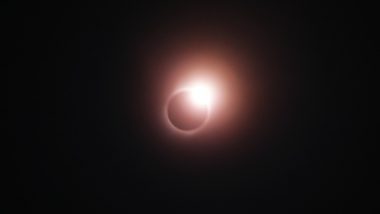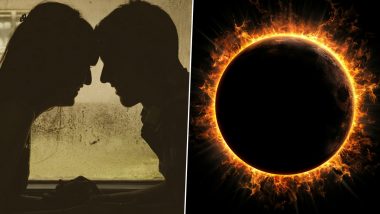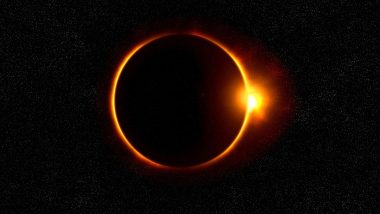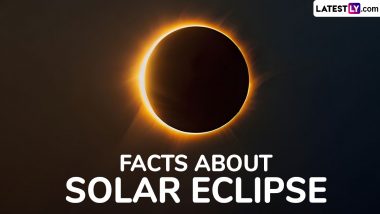The first solar eclipse of 2020 will occur on June 21. The eclipse will be visible from India, parts of Europe, Africa, Pacific, Asia, Indian Ocean and north of Australia. A solar eclipse two weeks after lunar eclipse; lunar penumbral eclipse 2020 occurred on June 5. As the moon is far from the Earth, it looks smaller and won't block the entire view of the sun. As Solar eclipse 2020 approaches, we bring some Frequently Asked Questions (FAQs) about the annular celestial event. From 'What is an annular solar eclipse?' to Can we sleep during a solar eclipse? we answer some of the widely asked questions about the event. India to Witness Solar Eclipse on June 21, Skygazers Can Observe ‘Ring of Fire’ During the Phenomenon.
What is an annular solar eclipse?
Solar eclipses happen when the new moon casts a shadow on Earth as it is between the sun and earth. The moon blocks the light of the sun from reaching the Earth causing a Solar Eclipse or Surya Grahan. The moon then casts a shadow onto Earth and the first shadow is known as the umbra while the second shadow is called the penumbra.
What is the difference between a total solar eclipse and annular solar eclipse?
Eclipses are divided into two major types: solar and lunar. Solar eclipses occur when the Moon passes between Earth and the Sun, leaving a shadow on Earth’s surface. Lunar eclipses occur when Earth passes between the Sun and the Moon, casting a shadow on the Moon. Solar Eclipse 2020 Date, Time and Place: Annular Solar Eclipse on June 21, Check Names of Countries Where Surya Grahan Will Be Visible.
Can we sleep during a solar eclipse?
There are various dos and don'ts people believe in during a solar eclipse. According to myths people should not sleep during an eclipse. However, according to a study, solar eclipse causes daytime darkness, hence it could affect one's sleep pattern. But the study doesn't explain if it is psychological or physical. While there is no direct physical effect of the eclipse, due to disruption in sleep pattern, many advise against sleeping.
What time is the solar eclipse in 2020?
The solar eclipse of June 21 will start at 9:15 am and end at 3:04 pm in India. The path of the annular solar eclipse will start near Gharsana in Rajasthan around 10:12 am and the phase of annularity will begin around 11:49 am and end at 11:50 am, Director of the M P Birla Planetarium Debi Prasad Duari said. In Kolkata, the partial eclipse will begin at 10:46 am and end at 2:17 pm, while the timing will be from 10:20 am to 1:48 pm in New Delhi, from 10 am to 1:27 pm in Mumbai, from 10:22 am to 1:41 pm in Chennai and between 10.13 am and 1.31 pm in Bengaluru. The sun will appear like a 'ring of fire' in the sky.
The name “annular” comes from the Latin word for ring, “annulus.” In most places, an annular eclipse looks like a partial solar eclipse which is the same during total solar eclipses and rare hybrid solar eclipses which have an annular maximum point in some locations and a total maximum point in other locations.
(The above story first appeared on LatestLY on Jun 16, 2020 03:02 PM IST. For more news and updates on politics, world, sports, entertainment and lifestyle, log on to our website latestly.com).













 Quickly
Quickly





















